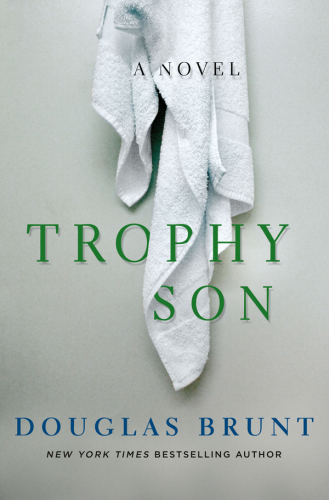
Trophy Son
A Novel
کتاب های مرتبط
- اطلاعات
- نقد و بررسی
- دیدگاه کاربران
نقد و بررسی

April 3, 2017
Brunt’s (The Means) third novel chronicles the tennis career of Anton Stratis, which commences under his father’s thumb when he’s still a child and terminates before he turns 30. The younger son of two former professional athletes, Anton endures a brutal training regimen fueled by his father’s ample time, money, and ambition. Anton remains close to his older brother, Panos, who manages to slip the noose of his father’s control and live a normal life. Anton’s daily existence is lonely, a loop between the court and his hotel room. His attempts at being a normal kid are thwarted by both his father and his inability to connect with others. Anton tries to find his footing as a person and a player as he approaches his 20s, ditching his dad; pursuing Ana Stokke, a beautiful actress; and seeing a psychologist. Unfortunately, it’s at this point that the book loses its momentum. While there is there occasional skirmish with his father, it seems unlikely that someone who had built his entire life around his son would relinquish control as easily as Anton’s father does. The writing explains obvious things to the reader, which dulls the impact of the scenes. Brunt’s novel works as a glimpse into the lives of professional athletes—with all the politics and the moral greyness that results when everyone is on some kind of enhancement cocktail—but he misses an opportunity by mishandling the book’s established conflicts.

February 15, 2017
A tennis prodigy struggles with his overbearing father and what it truly means to win.Brunt, who in previous novels has tackled finance (Ghost of Manhattan, 2012) and politics (The Means, 2014), returns with a fast-paced take on the world of pro sports. The novel follows Anton Stratis, the son of two former Olympic athletes, and chronicles his life and career as a tennis player, from auspicious beginnings as a child prodigy to his triumphs and failures on the pro circuit. Anton's path is never an easy one, beset by girl troubles, performance-enhancing drugs, and, above all, the specter of his domineering father, whose presence hovers over every scene and who pushes Anton to succeed at the expense of his own happiness. For all the thrilling tennis matches he depicts, Brunt ultimately cares less about whether his protagonist will find success on the court than about whether he will ever find peace off it. In his struggle to find self-actualization and happiness, however, Anton is never quite a believable character, and the conflict he faces between his own desires and his father's win-at-all-costs mentality never feels like anything more than a narrative contrivance. Indeed, the novel as a whole, while never dull, suffers from a persistent heavy-handedness in tone and plotting. Elements like an oft-mentioned rival feel thinly sketched, present only because prior sports fiction necessitated their inclusion, and dialogue alternates between cringeworthy and merely wooden, with turgid, on-the-nose lines like, "But a person is happy in his life only if he finds meaning in it, and meaning in life is positively correlated with choice in life. While I wasn't conscious of that fact then, I suffered from it unknowingly," appearing far too often. A pro sports bildungsroman with the excitement of a Federer-Nadal match but none of its grace.
COPYRIGHT(2017) Kirkus Reviews, ALL RIGHTS RESERVED.

March 15, 2017
Brunt's latest novel (The Means; Ghosts of Manhattan) focuses on our U.S. sports-obsessed lifestyle, in this case, the professional tennis tour during which players' bodies begin to deteriorate at age 18. Anton Stratis is such a player, initially an eight-year-old child phenomenon who sacrifices two decades to gain a top world ranking. Ignoring the strain of five-hour training sessions in 90-degree heat, Anton's alpha-dog father mercilessly molds him into a successful player. "I ate, slept, played tennis and rested for more tennis." Anton's first-person narrative carries the story as he grows weary of his tennis-dominated adolescence. Brunt reveals the sport's cruel expectations in his protagonist's struggles with performance-enhancing drugs, media pressure, and seeking psychiatric help. Hovering on the edges of Anton's isolated life is gorgeous actress Ana, a possible soul mate who also endures unrealistic expectations. VERDICT Brunt's writing hints of a YA coming-of age tale, with Anton battling to find his true self. However, several bedroom romps may be too intense for school library collections. Still, sports fiction fans will enjoy.--Rollie Welch, Lee Cty. P.L., Lehigh Acres, FL
Copyright 2017 Library Journal, LLC Used with permission.

May 15, 2017
Brunt's (The Means, 2015) third novel follows the creation and sculpting of a tennis prodigy, Anton Stratis, from his leaving school in eighth grade to train full-time to his retirement from the sport. Anton is a good kid. He honors his parents and adores his older brother, Panos, who has resigned himself to being the disappointment in the family. But cracks in Anton's perfection spread and widen when he realizes his life is no longer his own. I'd always thought of myself as carrying out instructions as though I were an appendage to someone else's body, he says. That someone else is his father, a 1984 Olympian who scrutinizes every stroke of the ball and agonizes over every unforced error. Toxic interactions with his father affect every relationship Anton develops with others, on and off the tennis court. Brunt's reputation for conducting tireless research to create page-turning fiction is fully upheld here, along with narrative inventiveness, as he offers a nuanced perspective on professional tennis and just how far a father can push his son.(Reprinted with permission of Booklist, copyright 2017, American Library Association.)

























دیدگاه کاربران